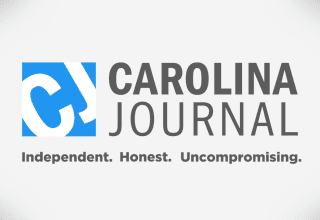On July 29, the North Carolina General Assembly voted to override Gov. Josh Stein’s vetoes of two key bills: one protecting the privacy rights of donors and the other repealing the carbon-reduction 2030 interim benchmarks, which is expected to significantly reduce North Carolinians’ power bills.
The Power Bill Reduction Act
SB 266 repeals North Carolina’s interim 2030 carbon-reduction mandate, which is projected to save consumers $15 billion by eliminating costly compliance measures. The Senate voted to override by 30-18, and the House voted 74-46.
“What this bill does is it addresses thoughtfully the change in energy demand from a base load energy production standpoint, as we wrestle with the changing climate in our state,” Sen. Timothy Moffit, R-Henderson, said on the Senate floor.
Environmentalist groups opposed the bill.
“Senate Bill 266 is a handout to a corporate monopoly disguised as reform, and North Carolinians will foot the bill,” Drew Ball, Southeast campaigns director for the Natural Resources Defense Council, said in a statement. “Duke Energy profits and residents pay the price through higher bills, lost jobs, and missed investment in better alternatives. Instead of building affordable, reliable clean energy, this bill pushes outdated, expensive gas plants that deepen our dependence on a dirty and fragile fuel supply.”
According to a press release from JLF, the Power Bill Reduction Act mandates that the North Carolina Utilities Commission evaluate energy plans under House Bill 951 (2021) based on affordability, reliability, and technological feasibility. The act strengthens transparency requirements and enforces comprehensive cost-benefit analyses for proposed energy transition strategies.
“By overriding this veto, the General Assembly is standing up for energy affordability and sound economic policy,” Donald Bryson, president and CEO of the John Locke Foundation, said in a press release. “North Carolinians deserve an energy strategy that prioritizes cost, reliability, and transparency — not one driven by expensive, arbitrary mandates.”
Personal Privacy Protection Act
SB 416 bars state agencies from collecting or disclosing nonprofit donor data and imposes penalties on officials who disclose that information. The legislature passed the bill, but Stein vetoed it, citing unrelated amendments. GOP lawmakers argued it protects free speech. The bill was overriden by 30-19 in the Senate and 74-46 in the House.
The legislation seeks to formally codify existing legal protections that prevent state and local government agencies from requesting, disclosing, or requiring information that reveals an individual’s affiliation with a nonprofit group.
Progressive organizations spoke against the bill, characterizing it as opening up opportunities for wealthy political interests to inject “dark money” into the state’s politics.
“Senate Bill 416 is not about protecting ordinary donors, it’s about shielding ultra-wealthy donors and political insiders who want to operate in the shadows,” said Melissa Price Kromm, executive director for NC For The People Action. “By weakening donor disclosure laws, this bill gives political nonprofits a green light to further hide who’s funding their activities. Voters deserve to know who is influencing our elections and shaping public policy — not just in theory, but in practice. Senate Bill 416 strips away that right and silences accountability. It opens the door to pay-to-play politics where those with deep pockets can purchase influence without public scrutiny.”
Following Stein’s veto of the bill in early July, Locke’s Bryson issued the following statement in a press release:
“Vetoing the Personal Privacy Protection Act leaves North Carolinians vulnerable to activist state employees and regulators who could pry into private nonprofit donor lists. The bill retained every existing nonprofit reporting requirement but erected a critical firewall forbidding any public agency or staffer from demanding or disclosing personal donor information — safeguards that are essential to a free democracy because they secure free association, free speech, and limited government.”
Donald Bryson, CEO of John Locke Foundation
With vetoes of both bills successfully overridden, the legislation will now become state law.
The post NCGA overrides vetoes of carbon bill, privacy act first appeared on Carolina Journal.
The post NCGA overrides vetoes of carbon bill, privacy act appeared first on First In Freedom Daily.
Click this link for the original source of this article.
Author: Katherine Zehnder
This content is courtesy of, and owned and copyrighted by, https://firstinfreedomdaily.com and its author. This content is made available by use of the public RSS feed offered by the host site and is used for educational purposes only. If you are the author or represent the host site and would like this content removed now and in the future, please contact USSANews.com using the email address in the Contact page found in the website menu.





